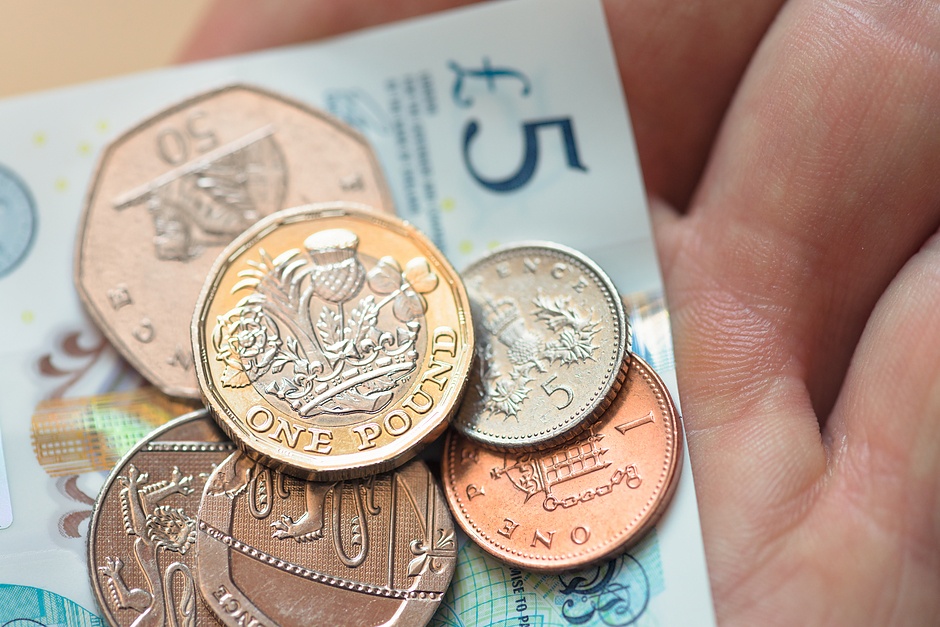Pound Sterling edges higher on improved market sentiment
- Pound Sterling moves higher while investors seek fresh guidance on interest rates.
- High wage growth and service inflation keep the UK’s inflation sticky.
- The core PCE inflation data will guide further action in the US Dollar.

The Pound Sterling (GBP) is stuck in a tight range in Monday’s European session as investors need more insights on the Bank of England’s (BoE) interest rates for fresh action. The GBP/USD struggles for direction as uncertainty over the timing of rate cuts by the BoE and the Federal Reserve (Fed) continues to persist.
Policymakers from the BoE and the Fed are reluctant to offer details on the timing of rate cuts as they need more evidence to confirm that inflation will come down to the 2% target. The United Kingdom’s wage growth and service inflation are skewed to the upside, remaining inconsistent with the rate required to achieve price stability.
The US Dollar Index (DXY), which gauges the value of the US Dollar against six rival currencies, oscillates in a range around 104.00 amid a data-packed week. Investors will keenly watch the core Personal Consumption Expenditure price index (PCE) data for January, which will deliver a meaningful outlook on interest rates.
Daily Digest Market Movers: Pound Sterling traces US Dollar's action
- Pound Sterling consolidates in a tight range around 1.2660 as investors await fresh guidance on the Bank of England’s interest rates.
- The market expectations for early rate cuts are waning due to higher wage growth.
- In a testimony before the UK Parliaments’ Treasury Committee, BoE Deputy Governor Ben Broadbent said the momentum in wage growth is double that required to bring down inflation to its 2% target.
- Investors await the commentary from various BoE policymakers this week.
- The BoE has been reiteraing the need for maintaining interest rates unchanged at 5.25% until they get convinced that inflation will sustainably return to the desired rate.
- Investors will keenly focus on commentary over concrete timing for rate cuts.
- Meanwhile, improving business optimism and economic outlook are a relief for BoE policymakers.
- This would allow the BoE to avoid a “hard landing” in the battle against stubborn inflation. The hard landing indicates a sharp contraction in economic activities while achieving price stability.
- While economists are anticipating an uptick in economic activities, recruitment data company Adzuna showed that job postings by British employers were hit significantly in January.
- The agency reported that job advertisements were 15% down annually at 867,000.
- "January 2024 has proven to be one of the most difficult starts to the year for job hunters in recent years with companies continuing to put hiring plans on ice," Adzuna co-founder Andrew Hunter said.
- Cooling labor market conditions would tame strong wage growth and will eventually provide a sigh of relief to BoE policymakers.
- Meanwhile, the US Dollar remains subdued even though investors have been convinced that the Federal Reserve (Fed) will not cut interest rates in the March-May monetary policy meetings.
- Last week, New York Federal Reserve President John Williams said rate cuts are on track later this year. When asked about sticky January Consumer Price Index (CPI) data, Williams said "My overall view of the economy basically hasn't changed based on one month of data."
Technical Analysis: Pound Sterling faces resistance near 1.2700
Pound Sterling trades inside Friday’s trading range as investors need fresh cues over the interest rate outlook. The broader outlook is sideways too as the pair oscillates in the Descending Triangle pattern formed on a daily timeframe. The aforementioned chart pattern indicates a sharp volatility contraction, carrying a slightly negative bias due to its formation of lower highs.
The horizontal support is plotted from December 13 low near 1.2500, while the downward-sloping border of the Descending Triangle pattern is placed from December 28 high at 1.2827. The pair holds above the 20 and 50-day Exponential Moving Averages (EMAs), which trade around 1.2630. Meanwhile, the 14-period Relative Strength Index (RSI) trades in the 40.00-60.00 region, indicating indecisiveness among market participants
BoE FAQs
What does the Bank of England do and how does it impact the Pound?
The Bank of England (BoE) decides monetary policy for the United Kingdom. Its primary goal is to achieve ‘price stability’, or a steady inflation rate of 2%. Its tool for achieving this is via the adjustment of base lending rates. The BoE sets the rate at which it lends to commercial banks and banks lend to each other, determining the level of interest rates in the economy overall. This also impacts the value of the Pound Sterling (GBP).
How does the Bank of England’s monetary policy influence Sterling?
When inflation is above the Bank of England’s target it responds by raising interest rates, making it more expensive for people and businesses to access credit. This is positive for the Pound Sterling because higher interest rates make the UK a more attractive place for global investors to park their money. When inflation falls below target, it is a sign economic growth is slowing, and the BoE will consider lowering interest rates to cheapen credit in the hope businesses will borrow to invest in growth-generating projects – a negative for the Pound Sterling.
What is Quantitative Easing (QE) and how does it affect the Pound?
In extreme situations, the Bank of England can enact a policy called Quantitative Easing (QE). QE is the process by which the BoE substantially increases the flow of credit in a stuck financial system. QE is a last resort policy when lowering interest rates will not achieve the necessary result. The process of QE involves the BoE printing money to buy assets – usually government or AAA-rated corporate bonds – from banks and other financial institutions. QE usually results in a weaker Pound Sterling.
What is Quantitative tightening (QT) and how does it affect the Pound Sterling?
Quantitative tightening (QT) is the reverse of QE, enacted when the economy is strengthening and inflation starts rising. Whilst in QE the Bank of England (BoE) purchases government and corporate bonds from financial institutions to encourage them to lend; in QT, the BoE stops buying more bonds, and stops reinvesting the principal maturing on the bonds it already holds. It is usually positive for the Pound Sterling.
Author

Sagar Dua
FXStreet
Sagar Dua is associated with the financial markets from his college days. Along with pursuing post-graduation in Commerce in 2014, he started his markets training with chart analysis.

















